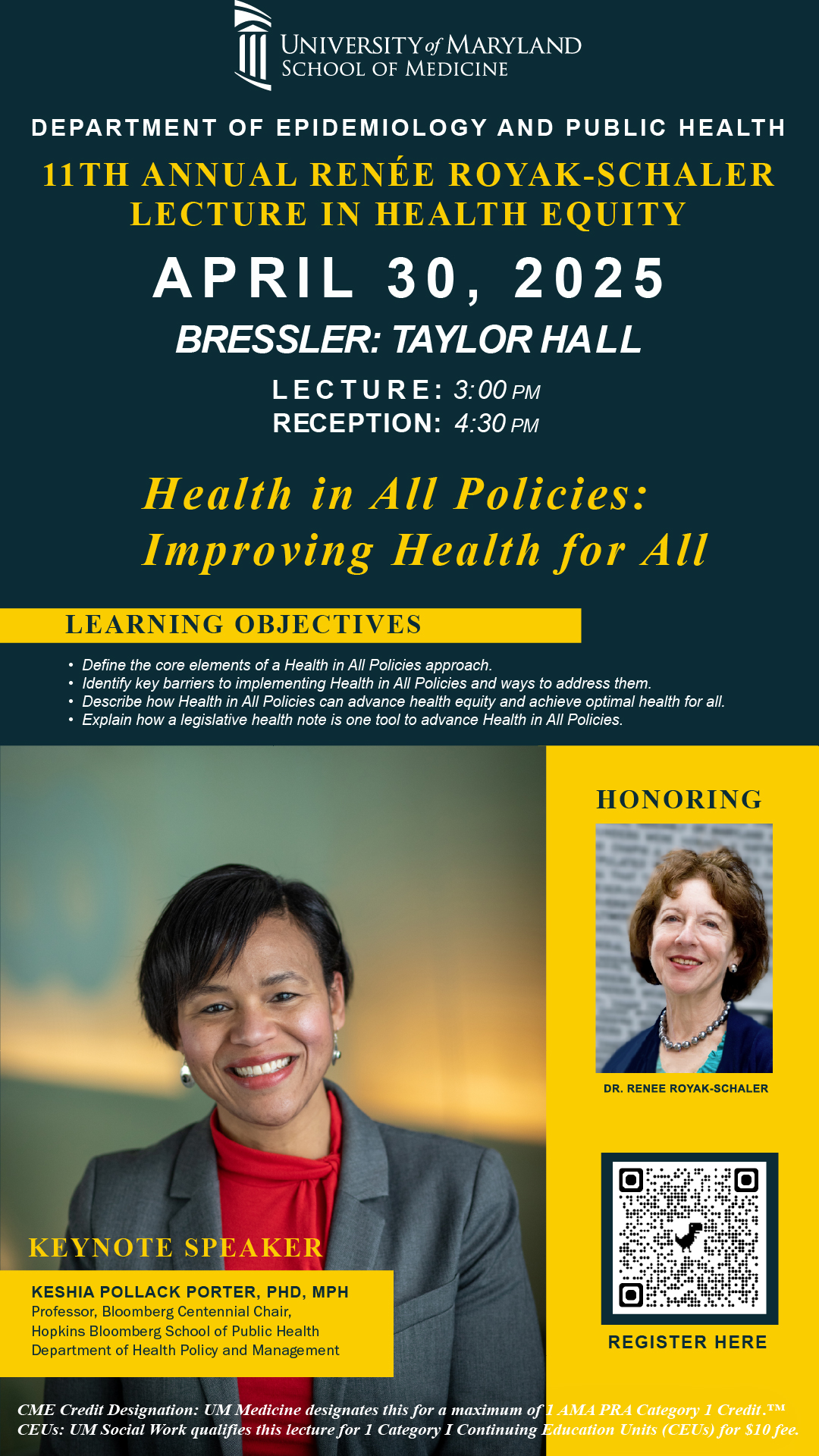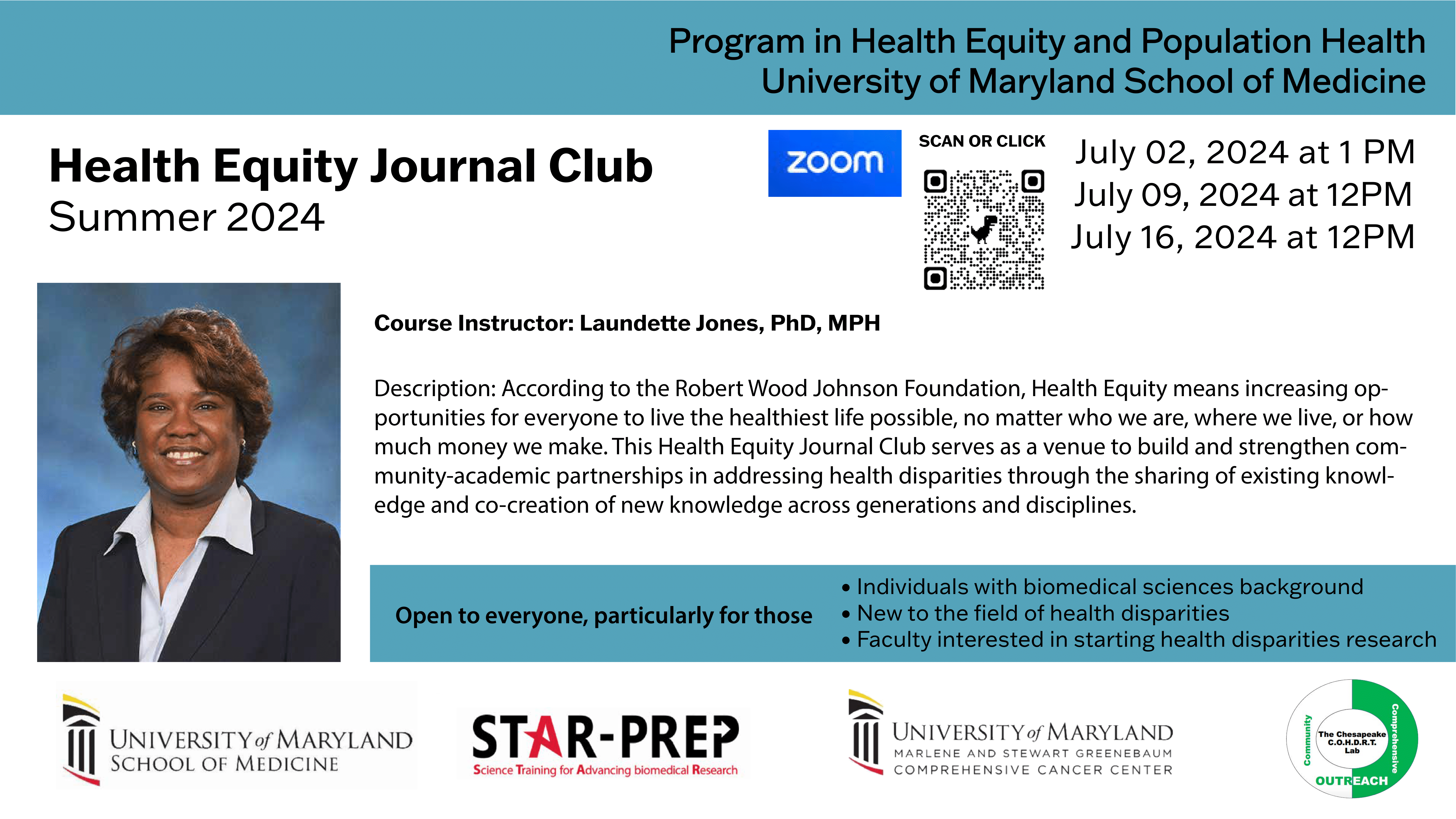Upcoming Events

ICPHR Methods and Evaluation Learning Community
International Collaboration for Participatory Health Research Meeting co-lead by Dr. Laundette Jones (UMB), Dr. Kim Ozano (The SCL Agency, UK), and Dr. Emily Zimmerman (VCU). These meetings will be held the 3rd Monday of each month until June 2025. Please let me know if you’d like to be added to the calendar invite. The group will be focusing on next steps for publishing following their scoping review, and reviewing and discussing the two articles below. Check out www.icphr.org for more information.
Executive Summary - Role of the Money
Full Report - Role of the Money
Time: 3rd Mondays, 10:00 AM Eastern Time (US and Canada)
Join Zoom Meeting
https://umaryland.zoom.us/j/99620595669?pwd=KOG29ma5i4JxXwQU8fmcIoLngQUewq.1
Meeting ID: 996 2059 5669
Passcode: 161781
Past Events
2024
2024

10th Annual Renée Royak-Schaler Lecture in Health Equity and Population Health
Topic: Transforming Public Health to Achieve Health Justice
Presenter: Ruqaiijah Yearby, JD, MPH
Ruqaiijah Yearby, J.D., M.P.H studies structural racism and discrimination in vaccine allocation and the equitable enforcement of housing laws and structural racism in the health care system.
2023
Health Disparities Journal Club
Summer 2023 Health Disparities Journal Club
June 22 - July 27, 2023
Thursdays at Noon via Zoom
9th Annual Renée Royak-Schaler Lecture in Health Equity and Population Health
Topic: Equity effects of real-world natural experiments to improve population health
Presenter: Alyce Adams, PhD
Dr. Adams' interdisciplinary research seeks to evaluate the impact of changes in drug coverage policy on access to essential medications, understand the drivers of disparities in treatment adherence among insured populations, and test strategies for maximizing the benefits of treatment outcomes while minimizing harms through informed decision-making.
2022
Health Disparities Journal Club
Summer 2022 Health Disparities Journal Club
June 23 – July 28, 2022
Thursdays at Noon via Zoom
8th Annual Renée Royak-Schaler Lecture in Health Equity and Population Health
Topic: Population Risk Stratification to Improve Breast Cancer Outcomes
Presenter: Olufunmilayo I. Olopade, MD, FACP
Dr. Olopade’s research is focused on gaining a better understanding of the root causes and genomic basis of cancer in diverse populations.
2021
Topic: The Impact of Unresolved Historical Trauma on Indigenous Health Equity
Presenter: Donald Warne, MD, MPH
Donald Warne, MD, MPH is the Associate Dean of Diversity, Equity and Inclusion as well as the Director of the Indians Into Medicine (INMED) and Master of Public Health Programs, and Professor of Family and Community Medicine at the School of Medicine and Health Sciences at the University of North Dakota. He also serves as the Senior Policy Advisor to the Great Plains Tribal Chairmen’s Health Board in Rapid City, SD. Dr. Warne is a member of the Oglala Lakota tribe from Pine Ridge, SD and comes from a long line of traditional healers and medicine men. He received his MD from Stanford University School of Medicine and his MPH from Harvard School of Public Health.
2019
2019
Topic: Social Capital and Disaster Resilience
Presenter: Ichiro Kawachi, MBChB, PhD
Ichiro Kawachi received both his medical degree and Ph.D. (in epidemiology) from the University of Otago, New Zealand. He has taught at the Harvard School of Public Health since 1992. Kawachi is the co-editor (with Lisa Berkman) of the first textbook on Social Epidemiology, published by Oxford University Press in 2000 (new and revised edition published in 2014).
2018
2018
Topic: Removing Obstacles to Eliminating Racial and Ethnic Disparities in Behavioral Health Care
Presenter: Margarita Alegría, PhD
Margarita Alegría, Ph.D., is the Chief of the Disparities Research Unit at Massachusetts General Hospital, and a Professor in the Departments of Medicine and Psychiatry at Harvard Medical School.
2017
Topic: When It Comes to Health, Does Zip Code Matter More than Genetic Code?
Presenter: Anthony B. Iton, MD, JD, MPH
A range of powerful evidence shows unequivocally that where you live, as well as your social circumstances, play a huge role in your health. This was the message delivered by Anthony B. Iton, MD, JD, MPH, Senior Vice President of Healthy Communities at the California Endowment, in a lecture April 18 at the University of Maryland School of Medicine (UM SOM).
2016
Topic: The Concepts of Health Disparities and Health Equity: Can We Get a Little More Clarity?”
Presenter: Paula Braveman, MD, MPH
Dr. Braveman is Director, Center on Social Disparities and Health, and Professor, Family and Community Medicine at the University of California, San Francisco.
2015
Topic: Neighborhoods and population health: Where have we been and where are we going?
Presenter: Ana Diez Roux, MD, PhD, MPH
Ana Diez Roux, MD, PhD, MPH is a physician and epidemiologist known worldwide for seminal research on health disparities and multilevel determinants of population health. Her work has had a major impact on public health research and practice.
2014
Topic: Making America Healthier For All: How Social Policies Can Promote Health
Presenter: David R. Williams, PhD, MPH
Dr. Williams is the Florence Sprague Norman and Laura Smart Norman Professor of Public Health and a Professor of African and African American Studies and of Sociology at Harvard University.
